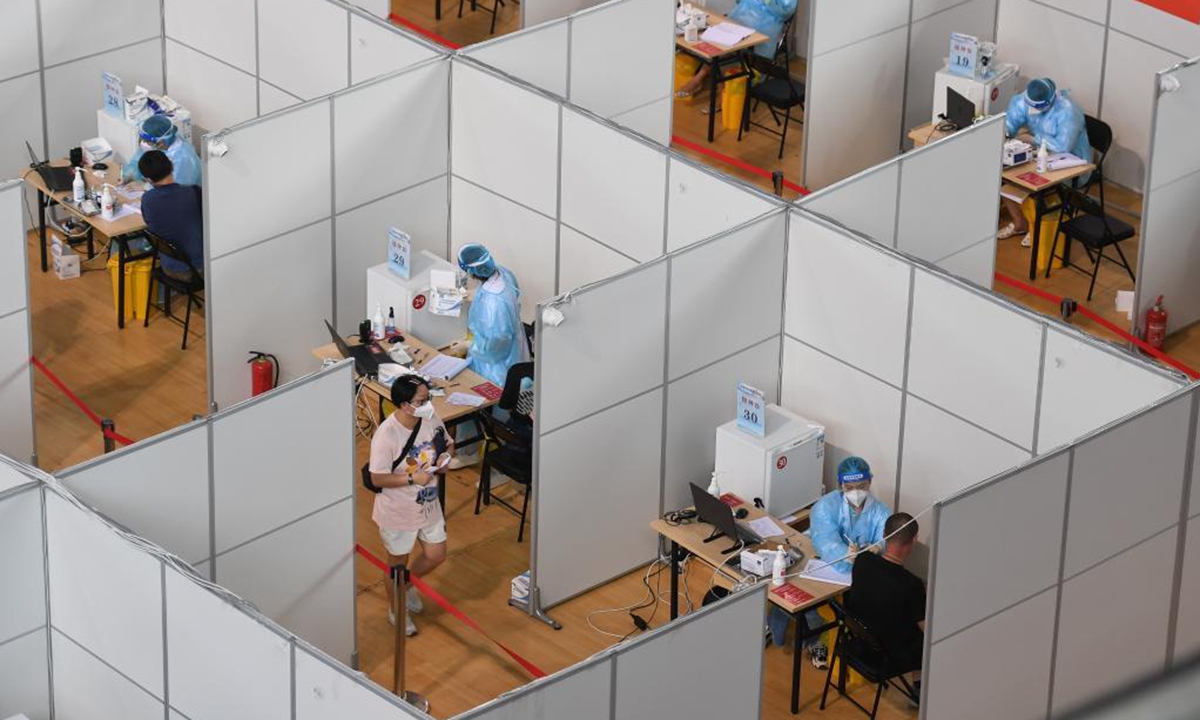
Residents get inoculated against the COVID-19 virus at a vaccination site in a stadium in Nanjing, capital of east China's Jiangsu Province, Aug. 2, 2021. The city of Nanjing has been organizing vaccinations from Sunday for those who are qualified to get the second shot in low-risk areas amid resurgence of COVID-19 infections.Photo:Xinhua
More than 30 officials in four epidemic-hit provinces have been punished for their slack response and ineffective management in dealing with latest COVID-19 outbreaks across China, including a vice mayor, district leaders, heads of the local health commissions, hospital management staff and officials from the airport and tourism sector.
The latest round of outbreaks, described as the most serious since last year's outbreak in Wuhan, Central China's Hubei Province, has seen 1,507 confirmed cases as of the end of Saturday.
Gao Qiang, China's former health minister, stressed the importance of plugging loopholes in warding off imported infections in an article published on Saturday, saying that the country is capable of eliminating the virus in the same way China swiftly contained the outbreak in 2020.
Experts said the timely punishment for the incompetent officials in the epidemic control work is an appropriate action as the anti-epidemic battle bears no loopholes, mistakes or neglect by those in charge of the work.
In
Nanjing, capital of East China's Jiangsu Province, where the latest outbreak started, at least 15 officials received penalties on Saturday, including Hu Wanjin, a vice mayor of Nanjing, Fang Zhongyou, Party chief of the Nanjing Health Commission and Wang Chao, commander of the anti-epidemic control work at Nanjing Lukou International Airport. The ineffective epidemic prevention and control at the airport was found to have triggered the outbreak.
In the Hunan Province tourist city of Zhangjiajie, which was a key spot of COVID-19 infections in the latest outbreak, 20 officials and public post holders were punished for their slack response in dealing with the flare-up.
The long list of punishments includes district officials, hospital management staff , staff with the tourism sector and related personnel to a local performance show for tourists. The performance caused a massive spread of the virus to at least eight provinces and regions across China.
The other two epidemic-stricken cities, Zhengzhou in Central China's Henan Province, and Yantai in East China's Shandong Province, also announced disciplinary actions against officials and personnel who performed ineffectively in their management and supervisory responsibilities for epidemic prevention and control.
Fu Guirong, secretary of Zhengzhou Health Commission Party group, was removed from her post. The Party chief of Zhengzhou Sixth People's Hospital, a designated hospital for treatment of overseas arrivals who are infected with COVID-19, was also removed from her post.
The announcement of the punishments was made on July 31, one day after the first case was reported in Zhengzhou.
Zhengzhou Health Commission was urged to make adjustments to the management of the hospital after many of the confirmed and asymptomatic COVID-19 patients in the city were found to be related to the hospital, including cleaning staff, medical staff, inpatients and their escorts.
The district head of Laishan district in Yantai, among others, was dismissed for failing to fulfill epidemic prevention and control. Yantai launched its second round of citywide nucleic acid testing on Saturday.
Wang Peiyu, a deputy head of Peking University's School of Public Health, told the Global Times on Sunday that the outbreak that started in Nanjing and spread rapidly to several provinces has shown the loopholes in the epidemic control work in some places, such as airports, and exposed the mistakes and lapses of some individuals who hold important posts in the overall anti-epidemic work.
"The outbreak is a wake-up call to all of us - the virus may slide in any time when we loosen controls. We must always tighten the string of epidemic prevention," he said.
Officials in the UK and Singapore have explicitly encouraged people to adapt to the virus and live with it. Zhang Wenhong, a leading infectious disease expert in Shanghai, also said the majority of virologists in the world agree that the world has to learn to live with this virus.
Gao refuted the idea, saying that it was such pursuit of the so-called "coexistence with the virus" that has led to the resurgence of the epidemic in many countries.
China's anti-epidemic strategy is a "double insurance" strategy of precise epidemic control and widespread vaccination, rather than replacing strict epidemic control with herd immunity, let alone "coexistence with the virus," he said in the article.
The painful lesson of the Nanjing epidemic told us that in the face of widespread vaccination, the central government's policy of normalizing epidemic control remains an important guideline to be followed in China's fight against the epidemic, he said.




